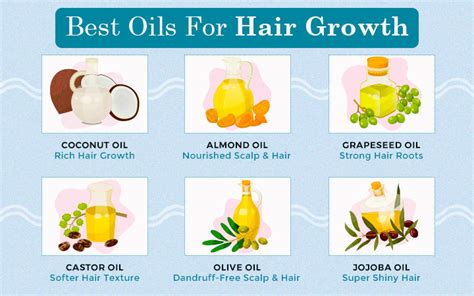The quest for luscious, healthy hair has led many to seek out the best hair growth oil. But with countless options available, it’s easy to feel overwhelmed. Let us guide you through the maze of hair care oils and help you make an informed decision.

The 10 Golden Oils for Hair Growth
- Argan Oil: Rich in vitamin E, antioxidants, and fatty acids, argan oil nourishes hair follicles, promotes cell regeneration, and strengthens strands.
- Coconut Oil: Packed with lauric acid, coconut oil penetrates deep into the hair shaft, moisturizing and preventing breakage.
- Olive Oil: Contains oleic acid, squalene, and vitamins E and K, which moisturize and protect hair from oxidative damage.
- Jojoba Oil: Resembling the skin’s natural oils, jojoba oil balances sebum production and prevents dandruff while promoting hair growth.
- Rosemary Oil: Studies show that rosemary oil applied topically can stimulate hair follicles and promote hair regeneration.
- Tea Tree Oil: Possessing antibacterial and antifungal properties, tea tree oil combats scalp infections and encourages healthy hair follicles.
- Lavender Oil: Known for its calming and relaxing effects, lavender oil helps reduce stress, which can contribute to hair loss.
- Amla Oil: Derived from Indian gooseberries, amla oil contains vitamin C and antioxidants that strengthen hair and stimulate growth.
- Castor Oil: While thick and viscous, castor oil is rich in ricinoleic acid, which boosts blood circulation and nourishes hair follicles.
- Avocado Oil: Packed with vitamins A, D, and E, avocado oil moisturizes, repairs damage, and promotes hair growth.
Oils for Different Hair Types
- Fine Hair: Argan oil, coconut oil, jojoba oil
- Thick Hair: Olive oil, rosemary oil, tea tree oil
- Dry Hair: Argan oil, coconut oil, avocado oil
- Oily Hair: Jojoba oil, rosemary oil, tea tree oil
Oils for Specific Hair Concerns
- Hair Loss: Rosemary oil, tea tree oil, castor oil
- Dandruff: Tea tree oil, jojoba oil, olive oil
- Split Ends: Coconut oil, argan oil, avocado oil
- Brittle Hair: Olive oil, castor oil, amla oil
How to Use Hair Growth Oils
- Dilute essential oils (e.g., rosemary, tea tree) in a carrier oil (e.g., coconut, olive) before applying.
- Apply oil to damp hair, massaging it into the scalp and working it through the strands.
- Cover hair with a shower cap or warm towel for 30-60 minutes.
- Rinse hair thoroughly with warm water.
- Use 1-2 times per week.
Tips and Tricks
- Test a small amount of oil on your skin before applying it to your hair to avoid allergic reactions.
- Use high-quality oils from reputable brands.
- Combine different oils to create a customized blend that addresses specific hair needs.
- Protect hair from the sun and heat damage while using hair growth oils.
- Be patient and consistent with oil application, as results may take several weeks to appear.
Common Mistakes to Avoid
- Applying undiluted essential oils directly to the scalp, which can cause irritation.
- Leaving oil on hair for extended periods, which can lead to clogged follicles.
- Using oils that are not suitable for your hair type or concerns.
- Not rinsing hair thoroughly after applying oil, which can leave hair oily and weighed down.
FAQs
- How long does it take for hair growth oils to show results? Results vary depending on the individual and the condition of their hair. Generally, results can be expected within 4-8 weeks of regular use.
- Can I use hair growth oils every day? While some oils can be used daily, it’s generally recommended to limit use to 1-2 times per week to avoid over-oiling and clogged follicles.
- Are hair growth oils safe for all hair types? Yes, most hair growth oils are safe for all hair types. However, it’s always advisable to do a patch test to ensure compatibility.
- Can I mix different hair growth oils? Yes, you can blend different oils to create a customized solution for your hair needs. However, ensure that you are familiar with the individual oils’ properties and that they complement each other.
- Should I apply hair growth oils to wet or dry hair? Applying oils to damp hair is recommended as it allows for better penetration and distribution.
- How do I store hair growth oils? Store oils in a cool, dark place away from direct sunlight or heat to preserve their freshness and potency.
Remember, hair growth is a multi-faceted process, and there is no universal “best” oil. By understanding your hair type and needs, you can select an oil or blend that will effectively support healthy hair growth.
